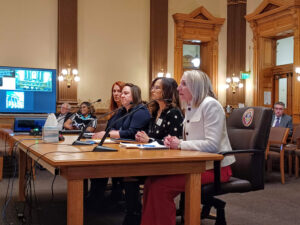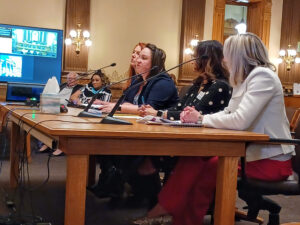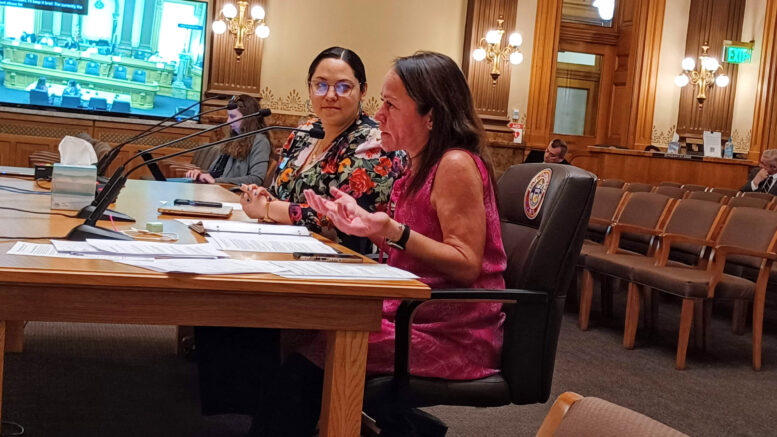A second legislative attempt to redefine harassment in Colorado law took its first step forward Wednesday — but with changes to its own new definition and questions on whether it will bar the state from being able to investigate Equal Employment Opportunity complaints.
The Protecting Opportunities and Workers’ Rights (POWR) Act advanced on a Democrat-led, party-line vote following a roughly four-hour hearing in the Senate Judiciary Committee, setting up a likely fight in the Senate Appropriations Committee over its nearly $4 million expected cost. But even as several Democrats said they want to see more changes before backing it on the chamber floor, they joined with a chorus of plaintiffs’ attorneys and members of the women’s bar to laud its underlying attempt to modernize workplace discrimination law.
The bill would make Colorado the fourth state to replace the decades-old legal precedent that behavior must be “severe or pervasive” to constitute harassment with a broader definition that would allow more workers to take legal action against employers. It also would make it harder for companies to assert affirmative defenses against claims, limit nondisclosure agreements in harassment cases and add new protections for individuals with disabilities.
Defining harassment
As introduced, Senate Bill 172, sponsored by Democratic Sens. Faith Winter of Westminster and Julie Gonzales of Denver, would have redefined harassment as behavior that is “offensive to a reasonable person in the same actual or perceived protected class.” But after complaints that the definition would be so broad as to open the floodgates for lawsuits alleging once-minor behavioral slips, sponsors amended the bill with language that was negotiated heavily by business groups over the past month.
The new definition defines actionable behavior as that which is “subjectively offensive to the individual alleging harassment and is reasonably offensive to an individual who is a member of the same protected class.” It specifies, however, that “petty slights, minor annoyances and lack of good manners” don’t constitute harassment unless there is a totality of circumstances that include the conduct being threatening, involving use of epithets and slurs and involving a power differential between the harasser and harassed individual.

A panel featuring (L to R) Special District Association of Colorado General Counsel Diane Criswell, Sherman & Howard Attorney Brooke Colaizzi, Special District Association Executive Director Ann Terry and Colorado Chamber of Commerce President/CEO Loren Furman testifies against the POWR Act on Wednesday.
Representatives of some organizations, including the Denver Metro Chamber of Commerce and Colorado Counties Inc., told committee members that the amendment went a long way toward making the regulations less onerous. But other groups, including the Colorado Chamber of Commerce and the Special District Association of Colorado, said the new standard remains so low that a single offense could result in a lawsuit — and pointed to a fiscal note from the nonpartisan Legislative Council predicting the Colorado Civil Rights Division will see a 25% increase in complaints.
“This bill creates the equivalent of a strict-liability standard for employers through the proposed change in the severe-or-pervasive definition,” said Jamie George, human resources/risk manager for the Ute Water Conservancy District. “The change in definition not only lowers the bar; it effectively removes the bar.”
“A Bogeyman”
Proponents like Sophie Mariam, labor policy analyst at Colorado Fiscal Institute, said the prediction seems an “overestimate” given that California saw just a 6% jump in complaints in the year following passage of a similar law there. Still, adding 41 new workers and spending an extra $3.8 million in the fiscal year beginning in July 2024 to accommodate the predicted influx is an immediate cost that could create much better outcomes in the years ahead, she said.
“The threat of this increased litigation is a bogeyman,” added Iris Halpern, a partner at Rathod Mohamedbhai LLC, noting that there were not significant increases in lawsuits in California, New York or Maryland after definition changes there. “Other states have been eliminating (the traditional standard), and it has not resulted in any issues.”
However, CCRD director Aubrey Elenis said there is a potentially significant change coming if the bill passes — namely, that her division will not be able to investigate some 800 claims per year that are dual-filed with the state government and the EEOC. The agency informed her that it would end its contract with the division because Colorado’s anti-discrimination act would have a different definition of harassment than federal law, and that in turn would mean that complainants would have to file separate federal and state claims and that employers would have to defend against multiple complaints, she said.

Aubrey Elenis, director of the Colorado Civil Rights Division, speaks via video in opposition to the POWR Act on Wednesday.
“The risk to our existing EEOC contract is now just too high,” said Elenis, noting that the division opposes the bill but will keep working with sponsors and the EEOC to see if there is a way to hold onto the existing work-share contracts.
Just before the end of the hearing, however, Denver employment attorney Rachel Ellis said that she and workers from her Livelihood Law firm reached out to three EEOC employees on Wednesday and were told there is no reason the work-share agreement would be canceled. Ellis did not elaborate on how that explanation was so different from the one the state’s top civil-rights administrator said she got, though she said she would reach out to Elenis on Thursday.
Affirmative defense
Winter and Gonzales also amended a section of SB 172 that makes it more difficult to claim an affirmative defense, removing several business-opposed provisions, including a requirement that employers have not received any discrimination complaints over the previous five years. However, a requirement that employers maintain a repository of all oral and written complaints to assert such a defense will create “endless mini trials” about whether every oral complaint offered by workers was carefully notated, said Brooke Colaizzi, chairwoman of the labor employment group at Sherman & Howard, testifying for the Colorado Chamber.

Brooke Colaizze, chairwoman of the labor employment group at Sherman & Howard and a member of the Colorado Chamber of Commerce’s Labor and Employment Council, speaks against the POWR Act on Wednesday.
A coalition of higher-education institutions also followed through on a letter that it sent last week seeking an exemption from the proposal or a slew of changes. Colleges and universities already must meet two different standards of harassment under federal Title VII and Title IX rules and adding a third definition moving beyond “severe or pervasive and “severe and pervasive” would be burdensome and costly, a trio of college officials said.
“I believe it’s telling of where other states are not willing to go by placing an unreasonable standard on employers,” said Lucia Padilla, general counsel for Colorado Mountain College, noting that only three states have moved away from the accepted definition of harassment. “Implementing this standard will essentially require all employers to have a sterile workplace … This goes too far.”
Such concerns fell off when compared to witness stories of serial harassers being allowed to continue operating under the state’s current definition or farm supervisors propositioning field workers and then firing those who complained in retaliation. And by making it easier for workers to punish the employers who cause them harm, the Legislature will begin to change the culture of Colorado’s workplaces, Gonzales and Winter said.
“This policy, I think at its core, is meant to meant to abandon and dispense with this notion that some harassment is tolerable as long as it’s not severe and as long as it does not happen frequently,” Gonzales said.
A similar bill died late in the 2021 session. The Legislature now has about a month to decide if its successor effort will become law.
